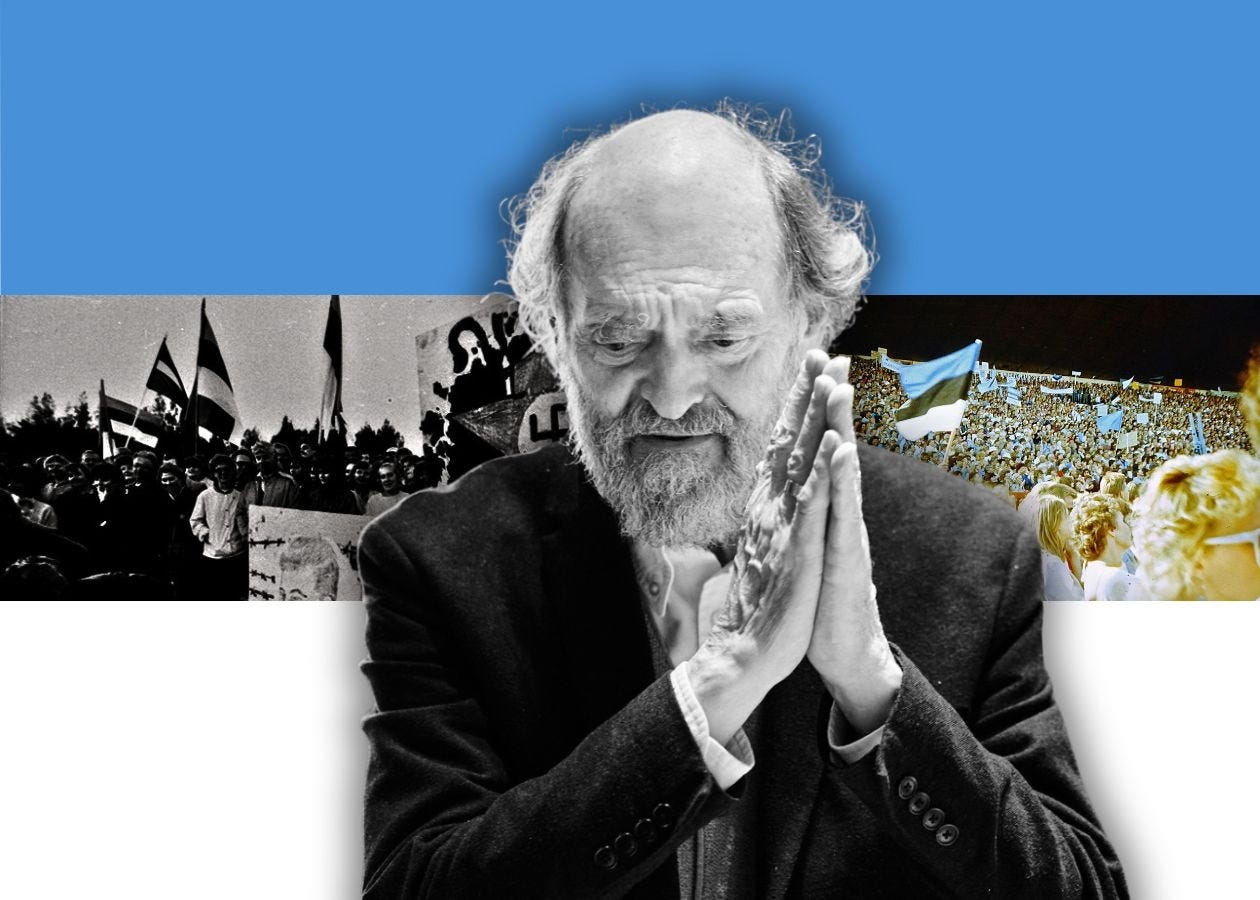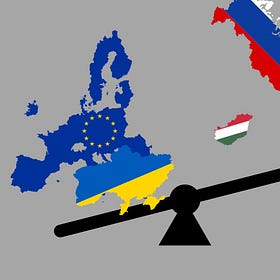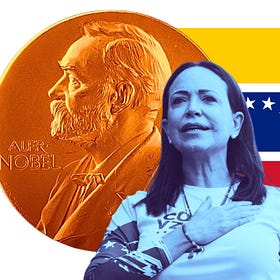Composer vs. Tyranny
Arvo Pärt, the Estonian master who has just turned 90, went his own way musically and has always stood up for the oppressed.
A more positive note from Garry Kasparov: I recently won a rematch against my fellow World Chess Champion Vishy Anand, and my friend and RDI Hero of Democracy Maria Corina Machado was awarded the Nobel Peace Prize. Call them small wins, but we don’t have enough good news these days. To celebrate, I’m giving away three chess sets, autographed by yours truly. Anyone signed up as a premium subscriber by TOMORROW, October 31, 2025 will be automatically entered to win.1.
Remember, I don’t take one kopek from your paid subscriptions. All proceeds support the work of the Renew Democracy Initiative, including direct aid to Ukraine, amplifying the work for political dissidents, and getting more content up on The Next Move.
— Garry Kasparov, Chairman, Renew Democracy Initiative
Jay Nordlinger is a senior resident fellow at the Renew Democracy Initiative and a contributor at The Next Move.
Maybe 20 years ago, someone said to me—in a challenging, almost angry tone—“Name me a good composer today, and don’t say Arvo Pärt!”
In my business, you get some peculiar questions and demands. (I am a music critic, as well as a political journalist.)
At this remove, I can’t remember what the guy’s problem was. Either he did not regard Pärt as a good composer, and was tired of hearing him cited as such, or he granted that Pärt was a good composer and wanted another name.
In any event, Pärt is a good composer—a very good one—and I could provide a respectable list of others, too.
According to people who keep track of such things, Pärt is the most-performed living classical composer (though, some years, he cedes the top position to John Williams, of movie fame). One notable thing about this is that Pärt is utterly self-effacing. He is the opposite of a self-promoter or striver after popularity.
In 1997, I began a piece about him,
The composer Arvo Pärt seems barely to belong to this age: Bearded, austere, and leading a forbiddingly private existence in Berlin, he studies the Scriptures and seeks after God. He also sets down music that sends record buyers running to the stores.
Since 2010, Pärt has lived full-time in his native country, Estonia. More about that in a moment.
This year, Pärt is marking his ninetieth birthday, or rather, the world is. Last week, Carnegie Hall in New York hosted two concerts of his music. The first featured the Estonian Festival Orchestra, and the second featured the Estonian Philharmonic Chamber Choir.
Estonia is a country known for its singing. The independence movement that took place there in the final years of the Soviet Union is known as the “Singing Revolution.” (For a 2011 piece of mine about this, go here.)
In Carnegie Hall, the Estonian Festival Orchestra was led by its founder, Paavo Järvi, who comes from a leading musical family in that country. His father, Neeme, is also a conductor. So is his brother, Kristjan. Their sister, Maarika, is a flutist, and she in fact plays in the orchestra.
Estonia is one of those countries that, in the musical world, punch above their weight. (The same is true of the other Baltic states: Latvia and Lithuania.)
Arvo Pärt was born on September 11, 1935. Four years later, Hitler and Stalin would sign their pact. In accordance with its terms, the Soviets invaded Estonia in June 1940. A year later, Hitler double-crossed his ally, and the Germans occupied Estonia. In 1944, the Soviets re-occupied the country and stayed there until the USSR collapsed in 1991.
When he was a young composer, Pärt practiced the techniques of his time—serialism, for example, which had been pioneered by Arnold Schoenberg. The Soviet authorities did not much like these methods. Neither did Pärt, frankly.
He was uncomfortable in modernism and what he called its “unbearable atmosphere of barbed wire.”
Pärt began looking back to the Baroque—to J.S. Bach, in particular—and to the Renaissance and to the pre-Renaissance: to early church music, such as Gregorian chant.
In 1968, he busted out with Credo, a piece for mixed choir, orchestra, and solo piano. Its premiere was conducted by Neeme Järvi. Fifty-seven years later, his son Paavo conducted the work in Carnegie Hall.
Credo was like a declaration of independence, with the composer saying, I am going another way. I have religious beliefs. I am going to express them, in my own musical language, informed by the past.
Pärt went on to compose passions, magnificats, litanies, Te Deums, etc.
If the Soviet authorities disliked Pärt’s modernism, they perhaps liked his “backward” religious music less. Soon after its premiere, Credo was banned. Eventually, Pärt was kicked out of the Estonian Composers Union. In 1980, he was able to immigrate, with his family, to the West. He took up residence in Berlin (the free half of that city, of course).
After 1991, Pärt divided his time between Berlin and Estonia, before settling down in his native land, as we have noted, in 2010.
Arvo Pärt’s music reflects both spirituality and a fundamental humanity. He has meant a great deal to people all over the world, but especially to people in the Soviet Union and the former Soviet Union. He has given them courage and consolation in dark times.
In 2006, Anna Politkovskaya, the Russian investigative reporter, was murdered in Moscow. She was murdered on October 7, Vladimir Putin’s birthday. Coincidence? As Garry Kasparov says, “I believe in coincidences, but I also believe in the KGB.”
Pärt announced that he was dedicating all performances of his works that season to Politkovskaya. He wrote, “Anna Politkovskaya staked her entire talent, energy, and—in the end—even her life on saving people who had become victims of the abuses prevailing in Russia.”
Meanwhile, Mikhail Khodorkovsky was a political prisoner, arguably Putin’s most famous. And, in 2008, Pärt dedicated a work to him:
With my composition, I would like to reach out my hand to the prisoner, and, through him, to all those imprisoned without rights in Russia. I dedicate my Fourth Symphony to Mikhail Khodorkovsky, wishing him peace of soul and vigilance of mind; anything more is beyond my power. I do not know whether he will ever be able to hear this composition. Nevertheless, I hope that my carrier pigeon does reach faraway Siberia one day.
Khodorkovsky was released in 2013. Six years later, I went to his offices in London to interview him. Before I left, he gave me a CD containing “his” symphony.
Move to 2022. In February of that year, Russia launched its full-scale assault on Ukraine. Arvo Pärt wrote out a message:
Dear friends in Ukraine, dear colleagues, dear all fighting for your home at the price of your life,
We bow before your bravery, bravery in the face of nearly unbearable suffering. . . .
Forgive us!
Forgive us for failing to protect you from a disaster unimaginable in our time.
He ended, “Long live Ukraine! Слава Україні!” Those last words, in Ukrainian, mean, “Glory to Ukraine!”
In Carnegie Hall last week, the Pärt concerts were packed, and listeners seemed to be rapt. Pardon the cliché, but a concert of this music is a “religious experience,” as well as a musical event.
Above, I quoted a piece of mine, from 1997, in which I said that Pärt “seems barely to belong to this age.” In 2004, the American composer Steve Reich said something interesting and apt:
I love his music, and I love the fact that he is such a brave, talented man. . . . He’s completely out of step with the zeitgeist and yet he’s enormously popular, which is so inspiring. His music fulfills a deep human need that has nothing to do with fashion.
Throughout his life, Arvo Pärt has stood for everything that the Soviet Union was not, and that other authoritarian states are not. He stands for individual conscience against conformity. Genuine religion against official atheism or state religion. Beauty against ugliness. Kindness against cruelty. Honesty against lies.
He is one of the great artists of our time.
An Arvo Pärt sampler:
Fratres (1977)
Cantus in Memoriam Benjamin Britten (1977)
Spiegel im Spiegel (1978)
Te Deum (1985)
On the fence about becoming a paid subscriber? We have a special offer to make the decision easier for you: $49 for an annual subscription—a 30% discount—now through November 8. Paid subscribers get exclusive benefits like access to interactive Zoom calls with Garry Kasparov. Anyone who signs up as a premium subscriber by October 31 will be automatically entered to win a chess set signed by Garry Kasparov.1
More from The Next Move:
Budapest Gambit: Europe’s Trump Card on Russia and Ukraine
After Putin’s phone call and Zelenskyy’s visit, Ukraine’s European allies need to break Donald Trump’s Russia fixation.
In Defense of María Corina Machado—and Freedom Fighters Everywhere
Uriel Epshtein responds to María Corina Machado’s critics. Jay Nordlinger contextualizes the award for the Venezuelan dissident and its place in Nobel history.
1. Please see full rules and regulations for The Next Move 2025 raffle.







Thanks Jay for this tribute to Arvo Part. I never made to one of the Baltic states but have always been interested in their history. When I was a teen, my sister worked for Tower Records and brought home a CD called Forgotten People, a recording of music by Estonian composer Veljo Tormis. I don’t remember much of the music but the tragic history of the people left an impression on me.
Cheeto Bankrupting The Country While Personally Making Billions
"Fascism is corporatism because it is a merger of state and corporate power". Benito Mussolini
The dollar as a fiat currency is on its last leg, the stock market is way overbought and held up by a number of AI company stocks, tariffs continue to tax companies and Americans, food insecurity is becoming a reality for Americans, health premiums will soar without federal subsidies, major companies are laying off workers, farmers/ranchers are getting screwed by the international tariff wars, and Cheeto fiddles while America burns ie building a ballroom
Cheeto is a spendthrift without a conscience and explains how he went bankrupt 5 times His tax Republican style on steroids Our national debt is $38T and climbing, probably topping $40T unless the market crash 21st century style takes us out of our profound misery
Billionaires like Musk, Theil, Karp, and Gracias want to take over the federal government but what they are going to inherit is a pile of garbage gifted to them by Cheeto This greed and power mongering will not end well for America and leave us a second rate country actions It’s more about the destruction of the country and hurting Americans, financially and physically, because he basically likes to hurt people As a sociopathic malignant narcissist he literally gets tremendous pleasure on hurting people